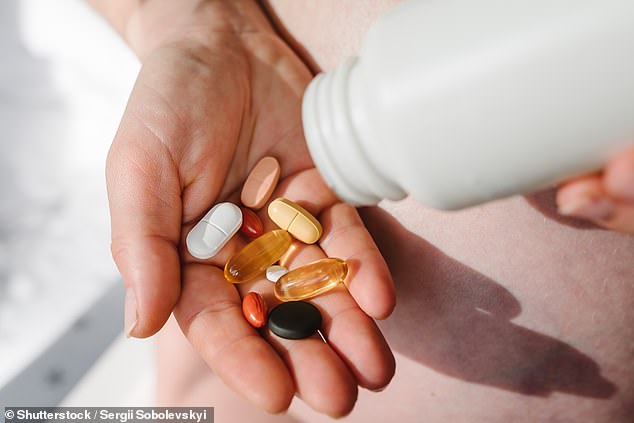Popular supplements sold on Britain’s high streets can contain toxic doses of vitamins and minerals, a shocking investigation revealed today.
Tests on supplements sold at popular health stores as well as online giants including Amazon found many contained more than double the safe upper limit recommended by UK health officials.
Two were even up to 12 times above permitted levels.
Exposure to such levels could put users at risk of conditions including weakening bones, kidney failure and damage to the nerves.
Consumer watchdog Which?, which carried out the probe, labelled the findings ‘shocking’ and urged the Government to ‘desperately’ implement ‘better regulation and oversight of the supplements industry’.
Sue Davies, head of food policy at Which?, said: ‘It’s shocking that supplements containing potentially dangerous doses of popular vitamins and minerals are so readily available online.
‘Taking more than the recommended dose of these vitamins and minerals has been linked to some really harmful side effects such as liver damage and weakened bones.
‘Better regulation and oversight of the supplements industry is desperately needed so that consumers are not put at risk by regularly consuming products which contain more than the advised safe upper levels.’
Tests on supplements sold at popular health stores as well as online giants including Amazon found many contained more than double the safe upper limit recommended by UK health officials
Under NHS guidance, adults should take 10 micrograms of Vitamin D every day but they can can safely tolerate up to 100mcg — most of which should come from dietary sources.
But, according to Which?, Superdrug Marketplace, TikTok shop and eBay all had Nuke Nutrition Vitamin D3 supplements listed, which contained 250 micrograms of Vitamin D — more than double the safe upper limit.
When the consumer watchdog contacted Nuke Nutrition to flag the breach, they immediately withdrew it from sale.
Similarly, Which?, also claimed it discovered two different vitamin D supplements on the online international marketplace, AliExpress, that contained 1,250 micrograms, more than 12 times the recommended daily dose.
According to the NHS, taking too much vitamin D can pose a serious risk of hypercalcaemia — a build-up of excess calcium in the body which can weaken the bones and damage the kidneys and the heart.
Unlike other supplements that are more difficult to overdose on, as excess levels are expelled in the urine, vitamin D is fat soluble, which means it hangs around in the body.
Which? also found vitamin D supplements targeted at children, such as Pslalae’s ‘height growth maximiser’, for sale on platforms such as Temu containing far more than the maximum recommended dose set by the NHS of 50mcg.
Vitamin D wasn’t the only supplement, however, that Which? found breached the safety threshold.

Temu had ‘Growth’ and ‘Height Growth Maximiser’ supplements from the brand Pslalae available to buy, described as ‘perfect for kids, teens and adults’. But, these vitamins contained 2,500 IU (62.5µg) of vitamin D3

Amazon’s most popular zinc supplement was from the brand WeightWorld and contained 50mg – double the safe upper level
Etsy, TikTok Shop and eBay were all found to sell vitamin A supplements, produced by Mother Nature Supplements containing up to 7,500 micrograms of the vitamin — five times the 1500mcg safe limit set by the NHS, Which? said.
However, all these sites carried a warning stating: ‘For pregnant/lactating women: consultation required before use’.
Meanwhile, one vitamin B6 supplement sold in Holland & Barrett was found to contain ten times the recommended daily safe limit of 10 micrograms.
According to the NHS, a dose of this size taken over time can increase the risk of suffering permanent peripheral neuropathy — damage to the nervous system in extremities like hands and feet that can cause muscle weakness, numbness and damage to co-ordination and balance.
Holland & Barrett withdrew the product from sale after being alerted of the high levels of the vitamin, Which? said.
But the consumer watchdog also found Amazon’s most popular zinc supplement, from the brand WeightWorld, contained double the safe upper limit of the essential mineral, at 50mg.
The brand did include a voluntary warning for supplements over this dose, stating ‘long term intake of 50mg of zinc may lead to anemia’.
But the NHS warns that having more than 25mg of zinc a day is more likely to lead to a copper deficiency, which can cause fatigue and anaemia.

Vitamin A is crucial for vision, supporting the immune system and maintaining healthy skin. The NHS advises consuming no more than 1500µg a day and in 2024, the European Food Safety Authority advised consuming no more than 3000µg
Some of the supplements investigated by Which? also didn’t include detail of how much of the active ingredient was actually in the supplement — making it nearly impossible for consumers to know how much they are taking, the watchdog said.
These types of supplements are classed as food under the Food Supplements Regulations 2003 and are regulated by the Food Standards Agency (FSA) and Food Standards Scotland (FSS).
Supplements, like all foods, are subject to a general requirement to be safe.
But safe upper levels are only specified within voluntary guidelines based on advice from the UK’s Expert Group on Vitamins and Minerals (EVM).
Etsy, Now Foods, Pslalae and WeightWorld did not respond to requests for comment.
But AliExpress said: ‘As a global marketplace, AliExpress places great emphasis on product safety.
‘The platform has effective prevention and control strategies in place, and we noticed that this non-compliance product had already been taken down by corresponding monitoring rule early this month before receiving this enquiry.
‘We appreciate your attention to this important issue and remain committed to fostering a safe and secure environment on our platform.’
Temu also said: ‘Temu complies with all applicable UK laws and regulations governing the sale of food supplements. We expect all sellers to follow local laws and regulations, and listings found to contravene these are subject to prompt review and removal.’
Amazon, meanwhile, said: ‘We require all products offered in our store to comply with applicable laws and regulations, and the products flagged by Which? meet the current government mandated regulatory guidance in relation to upper levels for vitamins and minerals.
‘However, we are aware there is continued debate around what the right guidance should be and we look forward to continuing to work with industry experts and government agencies in this area.’
eBay said: ‘eBay is committed to ensuring that products sold on our marketplace comply with our policies and all applicable laws.
‘The limits published by the NHS and the Food Standards Agency’s Expert Group on Vitamins and Minerals are advisory levels only.
‘We continue to review our policies in line with evolving guidance from health authorities to help ensure eBay remains a safe and trusted marketplace.’
Holland & Barrett also said: ‘At Holland & Barrett we are committed to providing high-quality, science-backed products, reflecting the latest scientific and regulatory guidance.
‘As a responsible retailer, we regularly carry our detailed reviews led by our science and regulatory teams and we took the proactive decision earlier this year to bring our vitamin B6 range in line with the EFSA advisory limit.
‘As a result, newly reformulated products will be available to customers this month. H&B products not in line with the EFSA guidelines are already being withdrawn, with this process due to be complete by end of October 2025.
‘Continuous improvement of our portfolio remains central to our mission of supporting the health and wellbeing of our customers, and we will continue to adapt our products in line with the most up to date scientific and regulatory advice.’


